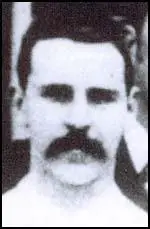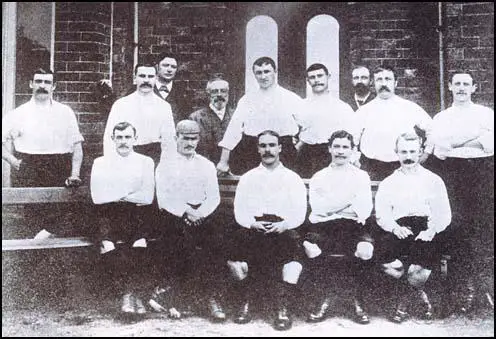Robert Howarth

Robert Howarth was born in Preston in 1865. He initially played rugby before taking up football. He joined Preston North End and made his debut for the club in 1883.
A talented full back, he represented Lancashire and the North of England against the South of England.
In January, 1884, Preston North End played the London side, Upton Park, in the FA Cup. After the game Upton Park complained to the Football Association that Preston was a professional, rather than an amateur team. The manager, William Sudell, admitted that his players were being paid but argued that this was common practice and did not breach regulations. However, the FA disagreed and expelled them from the competition.
Preston North End now joined forces with other clubs who were paying their players, such as Aston Villa and Sunderland. In October, 1884, these clubs threatened to form a break-away British Football Association. The Football Association responded by establishing a sub-committee, which included Sudell, to look into this issue. On 20th July, 1885, the FA announced that it was "in the interests of Association Football, to legalise the employment of professional football players, but only under certain restrictions". Clubs were allowed to pay players provided that they had either been born or had lived for two years within a six-mile radius of the ground.
Under the leadership of Major William Sudell, Preston North End became one of the best clubs in England. In the first round of the FA Cup in 1887-88, Preston beat Hyde 26-0. This is the highest score ever recorded in the competition. Preston played West Bromwich Albion in the final that year. According to reports, Preston was much the better team and Bob Roberts, the WBA goalkeeper made good saves from Fred Dewhurst, Jimmy Ross, John Goodall and George Drummond. Dewhurst did eventually score but WBA won the game 3-1.
Robert Howarth played his first game for England in February, 1887. England beat Ireland 7-0. The following year he was joined by his full-back partner, Bob Holmes and the club's centre-forward, John Goodall, in the England team.
In March, 1888, William McGregor, a director of Aston Villa, circulated a letter suggesting that "ten or twelve of the most prominent clubs in England combine to arrange home and away fixtures each season." The following month the Football League was formed. It consisted of six clubs from Lancashire (Preston North End, Accrington, Blackburn Rovers, Burnley and Everton) and six from the Midlands (Aston Villa, Derby County, Notts County, Stoke, West Bromwich Albion and Wolverhampton Wanderers). The main reason Sunderland was excluded was because the other clubs in the league objected to the costs of travelling to the North-East.
The first season of the Football League began in September, 1888. Over 6,000 people turned up to Deepdale to see Preston North End play the first game against Burnley. Preston's Fred Dewhurst scored a goal after only two minutes. Samuel Thompson put them two-up after five minutes and they went onto win the game 5-2. Preston North End won the first championship that year without losing a single match and acquired the name the "Invincibles". Eighteen wins and four draws gave them a 11 point lead at the top of the table. Howarth was one of the stars of the side.

Bob Holmes, Robert Howarth, William Sudell, John Graham and Robert Mills-Roberts are in the
back row. John Gordon, Jimmy Ross, John Goodall, Fred Dewhurst and Samuel Thompson
are sitting on the bench.
Preston also beat Wolverhampton Wanderers 3-0 to win the 1889 FA Cup Final. The goals were scored by Jimmy Ross, Fred Dewhurst and Samuel Thompson. Preston won the competition without conceding a single goal.
Preston also won the Football League the following season. This time it was much closer as they only beat Everton by one point. Preston lost the title to Everton in 1890-91. They also lost Howarth who was attracted away to their main rivals by higher wages.
Howarth played 59 games for Everton over the next two years. He also captained the side that was defeated by Wolverhampton Wanderers in the 1893 FA Cup Final. Howarth returned to Preston North End in 1894 but only managed three more league games before retiring from football to concentrate on his solicitor's practice in Preston.
Robert Howarth died in 1938.
